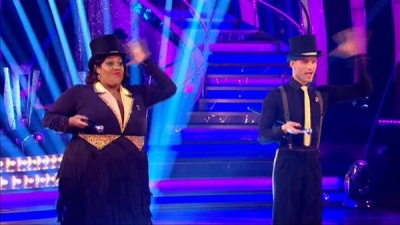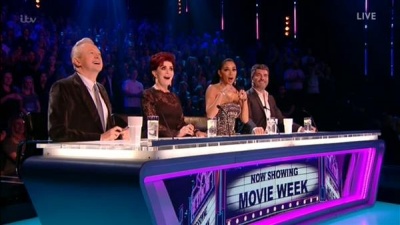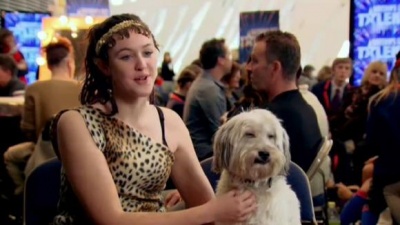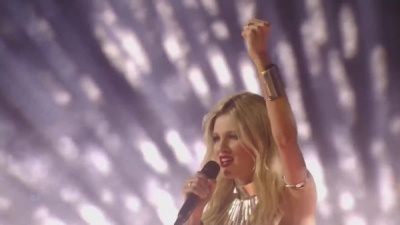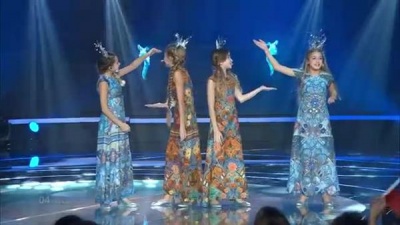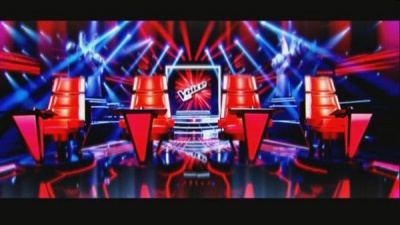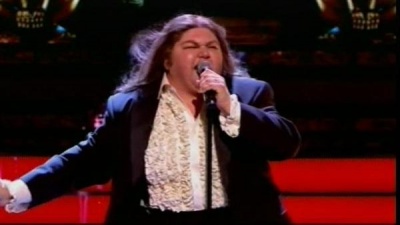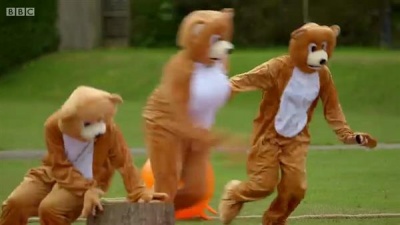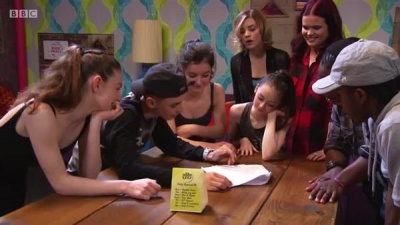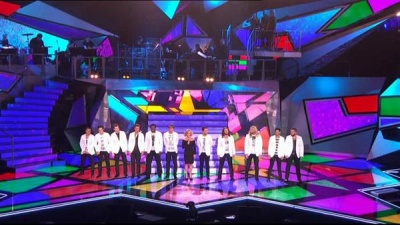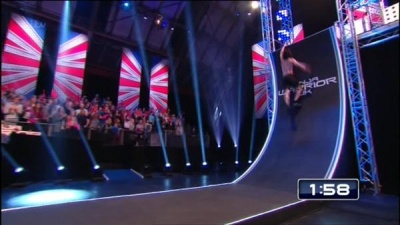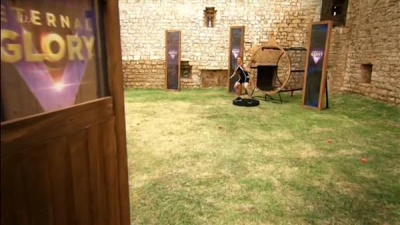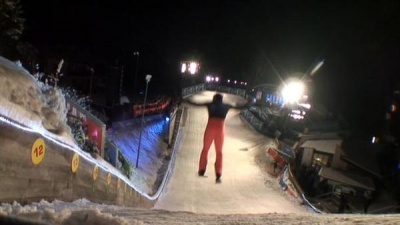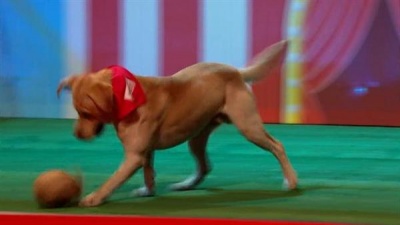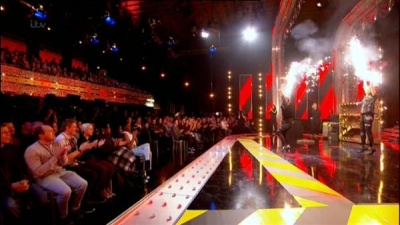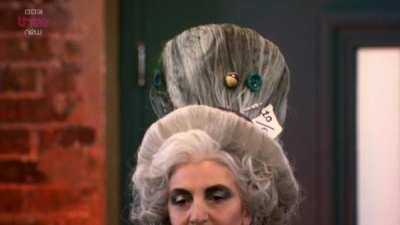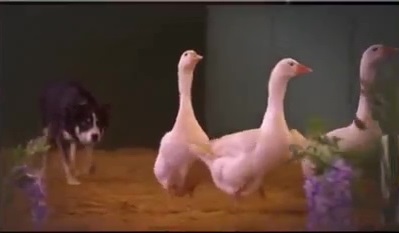Weaver's Week 2019-11-03
Last week | Weaver's Week Index | Next week
Part four of our review of The Decade With No Name, and it's
Contents |
Talent shows
At the end of the aughts, two of the biggest shows on television were The X Factor and Strictly Come Dancing. At the end of The Decade With No Name, two of the biggest shows on television are Strictly Come Dancing and The X Factor. How is this possible?
Strictly Come Dancing remains popular because it has moved with the times and done so imperceptibly. The biggest change was when Bruce Forsyth left the show, and even then his replacement was Claudia Winkleman from spin-off series It Takes Two. The judges change slowly, no more than one person per year. Alan Dedicoat's voiceover, the corny puns in the script, Dave Arch And His Lovely Lovely Band, controversy about some week's results, these have remained. So is the journey, the overall winner is always worthy of praise, they might not be the best dancer technically but the story has entranced the viewers.
Most of all, Strictly Come Dancing is always fun to watch. It's famous people working seriously with great dancers, bringing out their best in a positive atmosphere. Why do the studio audience always boo negative comments from the judges? In part, it's because we want to think all of the contestants are brilliant and doing their very best. Even Ed Balls.
The X Factor remains on air because it does enough for ITV. Raw audience figures might have tumbled, but ITV doesn't have anything better it can air. The X Factor has had four distinct phases in this decade. First was Simon and Louis and Nicole in 2010, and again from 2016 to 2018. The series had an edge, and knew what it wanted to achieve; the viewers didn't always agree with the outcome, and have made their own stars out of some rejects.
There was a Gary Barlow error from 2011-14, the quondam Take That frontman with interesting tax arrangements was pushed as the new Simon Cowell, but didn't have the cattiness to pull it off. Demot O'Leary had been a constant and stable presence through the decade, but took the 2015 series off: his replacements Olly Murs and Caroline Flack did their learning on screen and never recovered from a shaky start. And this year, a celebrity version is taking place, complete with Jenny Ryan from The Chase learning about her unexpected reprieve through social media. Throughout, The X Factor has tended to the negative, choosing to give most of its time to the squabbles amongst the judges.
Strictly is like a meal at Pizza Hut: we know pretty much what we're going to get, and we know it'll taste delicious while it lasts. The X Factor is like a grab bag from Big Mike's Pie Stall: we might get something delicious, we might get food poisoning and throw up all over Mr. Barlow's expensive shoes.
Got the Talent Factor
This Territory's Got Talent also continued through the decade. While it never quite reached the heights of 2009 – there's only one Diversity, there's only one Susan Boyle – the show's remained a huge draw and the bedrock of ITV's spring schedule. The format's scarcely changed, glacially improving with ideas such as the Golden Buzzer, and replacing Piers Moron with both David Walliams and Alesha Dixon.
The biggest stars to emerge from the show this decade were Ashleigh Butler and her performing dog Pudsey, whose three years of fame ended only when Pudsey fell ill and subsequently died. With many other territories making their own Got Talent, there's inevitably some crossover between editions. This year's Got Talent The Champions featured contestants from eighteen territorial versions. Sword swallower Alex Magala had competed in half of them.
International collaboration is the hallmark of the Eurovision Song Contest, which has continued all decade. A few things have been true about Eurovision Song Contests this decade: they've all been massive two week events, showing off a city and culture to 200 million viewers. The television shows have met the producers' vision, sometimes this hasn't matched with expectations in every territory.
And the contest has reasonable results: great songs rise towards the top, poor performances fall to the bottom. This last point causes much angst and anguish in this territory, as the BBC has consistently sent poor songs and staged poor performances. While RAI (Italy) can draw on a culture of song contests, and NPO (Netherlands) selected songs of great artistic merit, the BBC was still trying to win the 1984 contest. The late Terry Wogan still casts a long shadow.
Junior Eurovision has continued all decade. This is quite an achievement, as the contest looked in danger of collapsing as a childish pastime. The turning point came in 2013, when the EBU made the contest a little older, a bit more mature, and a much more coherent television show. These are teenagers doing the sort of thing you could do, viewers. A massively successful contest on Malta in 2014 cemented the improvements, and Junior Eurovision hasn't looked back. TG4 on Ireland joined the contestants a few years later, followed by S4C for Cymru last year. We'll have more on Junior Eurovision next month.
The EBU stages other competitions for young performers. Eurovision Young Musicians runs every second year, and the BBC has a domestic contest of its own. Eurovision Young Dancers took place a few times, but it's not something many broadcasters are interested in; the BBC never associated its domestic contest with the Eurovision version. There's been no return of the Senior Dance contest, but they have invented a Choir contest, featuring winners of S4C's biennial Côr Cymru. Choir shows on anglophone channels were less successful - Don't Stop Believing (C5), Sing (The Satellite Channel), Pitch Battle (BBC1) were all one-series wonders.
Something to sing about
The biggest new talent show of the decade, BBC The Voice of Holland of This Territory came to our screens in 2012. It was a domestic version of The Voice of Holland, starring will.i.am and Jessie J but mostly The Incredible Spinning Chairs. These blind auditions are the highlight of the series: we viewers get to see the performances, but the judges sit with their backs turned, and only hear the singing. Only if they're interested in taking the performer further can the judge see the singer.
The problem with The Voice: there's a whole stage after these auditions. There are "battle rounds", where the aim is to sing louder than your opponent. There are live performances and eventually a winner is crowned. Viewers aren't bothered about these later rounds: after all these years, The Voice has found as many lasting careers as the Eurovision Song Contest (Becky Hill and Lena, respectively).
Throughout The Decade With No Name, the BBC has been used as a football by politicians. One source of criticism was that the Beeb made entertaining shows that people wanted to watch, and The Voice was their shining example. No, the critique doesn't make any sense at all, but so many critics of the BBC attack the corporation for no logical reason. In the event, The Voice transferred from the BBC to ITV in 2017, after ITV bought producers Talpa. They've also made a junior version of the show.
ITV's other singing shows were best described as "wouldn't get will.i.am to turn for anything". Can't Sing Singers was an interesting idea – show how someone cannot sing, then come back a few weeks later and see if they're any better. Might have worked as a one off, failed as a series. Earlier in the decade, Your Face Sounds Familiar was a Celebrity Stars in Their Eyes series, where famous people sung other people's songs while dressed as them. Harry Hill revived the original Stars in Their Eyes in a strange format – neither a straight revival nor a full-on comedy.
At the start of the decade, ITV's Sing If You Can tried to get famous people to sing while stagehands sprayed crazy foam in their face, and someone danced as a gorilla beside them. They've used a similar distraction test on CBBC's Got What It Takes?, a show seeking someone to perform at the BBC's own Big Weekend festival. The key point of Got What It Takes? is how success is a family effort, it involves the starlet's mother making sacrifices and doing strange things – like play football while dressed as a monkey. The feelgood show has a serious message: stardom isn't for everyone, and there's no shame in saying "this level of fame is enough for me."
The great missing format is Rising Star, a massive success sold around the world in 2014, after a successful series on Israeli television. What works there doesn't necessarily export, something we could have told you last decade from The Vault. It turned out that Rising Star stiffed in every other territory, and ITV (which had bought the rights to the format) decided not to make the shows. Perhaps they were helped by Channel 4's spoiler series The Singer Takes it All, four episodes were enough.
Terpsichore in Distressed Jeans
The idea behind Rising Star was that the audience (at home, or in a studio) would approve the act they're seeing, and if enough approved, the curtain would rise and the performer would go through. We finally saw this idea on our screens this year, on the BBC's The Greatest Dancer. A contest between dance performers and troupes, the later rounds involved a public vote. It was dance as an instant emotional fix, not as art, not as personal liberation, not even as entertainment. We found it sterile.
More fulfilling was Taking The Next Step, a CBBC show seeking someone for a cameo on The Next Step. Here, the children showed what they've achieved with a lifetime of practice and a lot of dedication. Note how CBBC's talent shows offer very short performance prizes: a ten-minute spot on a music stage, a brief cameo on a telly show. We're not here for the prize, we're here for the journey and the quality performances. See also: So You Think You Can Dance, a Nigel Lythgoe format that does great things internationally. Here, it did two series and hasn't been seen since; the public weren't interested in great art on a Saturday night.
ITV tried a number of dance shows. Stepping Out was almost a clone of Strictly Come Dancing, but using real-life couples rather than star-and-professional. Could have run for more than the one series. Dance Dance Dance tried to show the wonders of a back-projection video board, but when we'd seen the gimmick a handful of times, the show had nothing left to offer. They ran Dancing on Ice for a few years, then rested the format, and brought it back out of cold storage because no-one could think of anything better.
There haven't been many casting shows this decade. The sequence of Andrew Lloyd Webber's shows finished with I'd Do Anything (casting for Oliver). Then he defected to ITV for Superstar (casting for Jesus Christ Superstar In A Big Tent), and lost any credibility he might have had. The format lay dormant until Let It Shine found an all-singing all-dancing all-acting band for Gary Barlow's jukebox musical of Gary Barlow songs. Only after the final whistle did we find that the band were background characters and not the stars of the show. And a lot of people were very sore, and we're not sure the musical ever opened.
Sports
Ninja Warrior (ITV) is the biggest series of the decade. A localised version of Sasuke, Ninja Warrior is an obstacle course requiring absolute perfection – and as the contest goes on, the course moves from challenging to difficult to rock-hard. The course is difficult but beatable, and the show attracts lots of ultra-fit men with upper body strength. (Relatively few women: the course design doesn't favour the anatomy of kunoichi.) Ben Shepherd hosts with the right mixture of awe and honesty, Rochelle Humes does the interviews (mostly "You fell off: what went wrong?"), and Chris Kamara has made himself famous by shrieking down the microphone.
Ninja Warrior is a successor to Total Wipeout (BBC1), which ran for the early part of the decade. They tried to recapture the big dumb games on Cannonball (ITV), but that proved to float like a, er, cannonball. The light channel also tried Play to the Whistle, a panel game that tried – and failed – to rival A League of Their Own (The Satellite Channel).
Eternal Glory was ITV's serious sports challenge. A mixture of endurance, spectacle, and atmosphere. We loved the "night duels", tests of patience and concentration, conducted in a clearing during pitch darkness. The only people in the world are these contestants, and host Richard Bacon. While some of the events made for dull television, some worked brilliantly. The show still sells internationally, but not in this insular market.
Football's Next Star on The Satellite Channel, and Can You Kick It? on CBBC, were both contests of football skill for young competitors. The prize was on the journey, finalists get to meet their sporting heroes (and Sam and Mark). Ultimate Sports Day, also on CBBC, tested groups of children in various indoors athletic events. Grown-up telly had a brief revival of Superstars, never stretching to a series.
The Jump ran on Channel 4 for much of the decade. It asked celebrities to learn how to ski jump, how to toboggan, how to fall over and break many limbs. The series will be remembered for its many injuries, giving much business to hospitals near Innsbruck. Mission Survive (ITV) asked celebrities to fend for themselves in the inhospitable jungle, guided by survival expert Bear Grylls. He later made The Island on Channel 4, encouraging civilians to survive on a deserted island; this year's series had a competition element. S4C put young people through their paces on Y Gemau Gwyllt and had strangers try to work together on Dianc!.
There was a brief fad for performing dogs on television, after the success of Ashleigh and Pudsey. CBBC commissioned Who Let the Dogs Out? for a number of years. There were short series of Superstar Dogs (C4) and Sport Relief's Top Dog (BBC2). The latter was replaced by Let's Play Darts for Comic Relief, a straightforward sports-on-telly challenge.
The apotheosis of "celebrities learning new skills" television was Tumble, competitive gymnastics with more than a dash of circus acrobatics. The champion, Bobby Lockwood, had an injury in the final and performed poorly, but won the public vote courtesy of his fans.
Others...
We've a lot of time for Stephen Mulhern, he's moved up from forgettable quiz Magic Numbers to be the smiling host of In for a Penny. Even his showbiz talent couldn't save Get Your Act Together, a show commissioned to fill the gap where Rising Star should have been. Celebrities learned a showy skill, demonstrated it in front of a theatre audience, and the best came back for the final. There was a mixture of performance, and training, and comments from the audience, and editorial meetings, and goodness knows what other backstage happenings. Ultimately, there wasn't enough show for the slot, and the series never looked like coming back. Still, better than Rising Star.
Amazing Greys (ITV) challenged a group of young people to pit their skills against some superstar OAPs. The youngsters came to the challenges cold, the older people had been training all their lives. It's a battle of the ages, for the ages, between the ages. Paddy McGuinness and Angela Rippon represented their teams well.
We really enjoyed Hair (BBC3, later BBC2). Young hairdressers were challenged to make fantastic creations on other people's heads, judged on technical excellence and artistic impression. Steve Jones was the perfect host, able to make the contestants feel at home, and explain to us viewers what the judges were looking for. Great to see that he's gone far, he's now doing the same job for Channel 4's motor racing shows.
Lego Masters (Channel 4) was unalloyed joy. The toy for children of all ages allows one to make all sorts of wild models, constructions that move under their own power. It's mostly about the design, and about the pairs of contestants who were on the show. The judges always praised where they could, gave critique in a constructive way. It was a positive programme, if a little bit too blokey, and will have inspired some people to try and replicate what they'd seen.
And while very long-running show One Man and His Dog got folded into Countryfile, we still haven't quite recovered from the absolutely bizarre Flockstars (ITV). Celebrities learn how sheepdog trials work, and demonstrate their abilities in the show ring. Four sheep might be under perfect control, or they might run all over the arena. Cheer for the brilliance, chortle at the incompetence. Later shows predicted a fad from some years later: here was the debut of the Goose Game.
This Week and Next
Is there a big transatlantic audience for A League of Their Own? CBS certainly thinks so, they've ordered a series of the sports-based panel show.
Rumours that Taskmaster is to move channel. Avalon's hugely successful game of comedians larking about might move from UKTV's Dave channel and appear on Channel 4. These reports have not been confirmed at the time of writing.
BARB ratings in the week to 20 October.
- Strictly Come Dancing is still television's most popular show (BBC1, Sat, 10.2m). Bake Off comes next (C4, Tue, 8.9m), with Coronation Street the top non-game show (ITV, Wed, 6.75m).
- The X Factor Colon Celebrity (ITV, Sat, 5.15m) was at Houses Rented By the Production Team On Behalf Of the Judges. High ratings on Friday night: the best audience of the year for Have I Got News for You (BBC1, 4.95m) and Would I Lie to You? (BBC1, 4.05m), and for Bake Off an Extra Slice (C4, 1.94m).
- Good scores for BBC1's Saturday quizzes, Pointless Celebrities (4.15m) and The Wall (3.9m) are both holding steady week-to-week. The Chase is moving up as the nights draw in (ITV, Mon, 3.95m). Celebrity Hunted did well on Channel 4 (Sun, 3.15m).
- Only Connect (2.17m) won BBC2's Quizzy Monday battle, ahead of University Challenge (2.15m) and Mastermind (Fri, 1.11m). Snackmasters (C4, Tue, 2.11m) pulled two million for all three episodes: great result for a lovely series. The Circle (C4, Fri, 1.6m) finished 20% below its launch.
- On non-PSB channels, Taskmaster was the top game (Dave, Wed, 1m). Celebrity Juice (ITV2, Thu, 645,000), and Celebrity Coach Trip (E4, Mon, 410,000) take the other medal places. ITV2's Don't Hate the Playaz came back (Wed, 245,000), losing its head-to-head against Dave's Comedians Giving Lectures (300,000).
As one tent comes down, another goes up. Junior Bake Off arrives on C4 (weekdays). Over on the Beeb, Masterchef The Professionals starts (BBC2, from Tue), and runs until Christmas. It's the series final for Taskmaster (Dave, Wed).
Photo credits: BBC, Syco/Thames, EBU/KAN, EBU/BNT, Talpa, Initial (an Endemol company), Rize USA, CBBC/Temple Street Productions, ITV Studios, Potato (an ITV Studios company), Two Four, Two Four and Group M, BBC Events Production London, ITV Studios, Liberty Bell.

